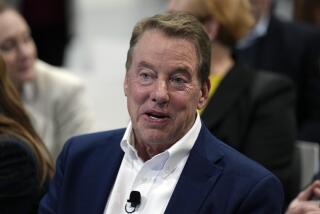Mileage Is Job No. 1
- Share via
Ford Motor Co. turns 100 on Monday. But the automaker doesn’t have much to celebrate: The Model T got better gas mileage than the average Ford vehicle sold today, and the company is rapidly losing market share to foreign competitors who have made modern gas-saving technology a priority.
When William Clay Ford Jr. took over the company in October 2001, environmentalists hailed him as an enlightened executive -- one who admitted that his products threatened the environment and who wanted to be part of the solution.
How to do that?
By building cars and trucks that get much better gas mileage, which would save customers money at the gas pump, cut global-warming pollution and reduce the nation’s dependence on foreign oil.
But Ford has failed to deliver. In fact, his company has moved backward under Ford’s stewardship. The average fuel economy of its new vehicles is at a 20-year low.
Last year, Ford joined other automakers in a multimillion-dollar lobbying effort that convinced Congress to reject higher fuel economy standards. Although the industry had argued that they could more effectively improve fuel economy without federal mandates, Ford’s own latest Corporate Citizenship Report revealed that the company had made no progress toward that goal over the previous year.
The report also warned that Ford’s strategy to address global warming “will be tempered by our near-term business interests.” And in April, the company announced that it was breaking a promise to make a 25% improvement in the fuel economy of its SUVs by 2005.
Yet just last month, Ford -- still trying to reassert his commitment to the environment -- predicted in an Automotive News interview that in 25 years all light vehicles could be powered by either gasoline-electric hybrid motors or hydrogen.
After putting his company in reverse for a year and a half, it’s difficult to take him at his word: Why wait 25 years to tackle serious problems like global warming and oil dependence when simpler fuel economy improvements could start having an effect almost immediately?
The technology exists to allow the automaker to achieve a fleetwide average of 40 miles per gallon. Better engines, transmissions, aerodynamics and other technologies could be built into vehicles of all sizes while enhancing performance, safety and affordability.
Yet Ford has largely left these innovative technologies on the shelf. Five years after Toyota put the first hybrid on the market, the company has yet to get into the game.
By entering that game it would do itself a favor. Toyota and Honda have established themselves as industry leaders in fuel-efficient technology. Their innovative models -- both hybrids and conventional engines with modern, fuel-saving components -- are disproportionately popular with younger consumers, whom automakers prize because they’ll be buying cars for the next 50 years.
If Ford is to go on creating jobs for its workers and generating profits for its shareholders, it badly needs to start producing vehicles that use available technology to go much farther on a gallon of gas.
Turning an enormous, traditional 20th century company into an innovative, 21st century trailblazer isn’t something that can be done overnight or without significant internal resistance. But with committed and energetic leadership, it can be accomplished.
After a year of corporate scandals, Americans are hungry to find responsible executives. William Clay Ford Jr. has a chance to prove that he is one.






